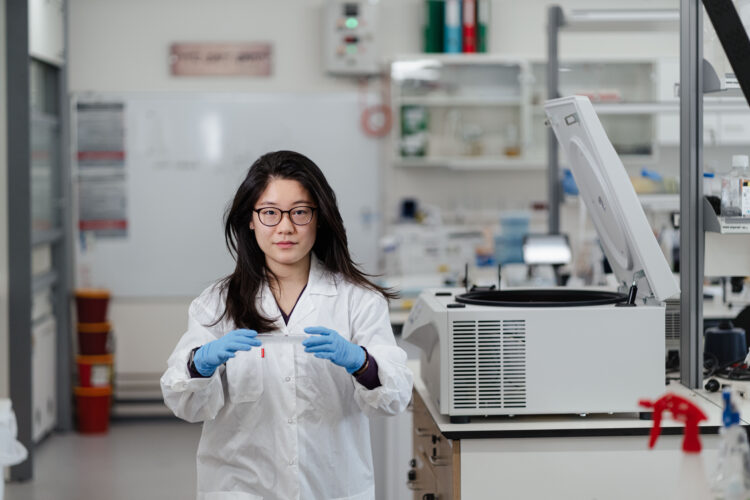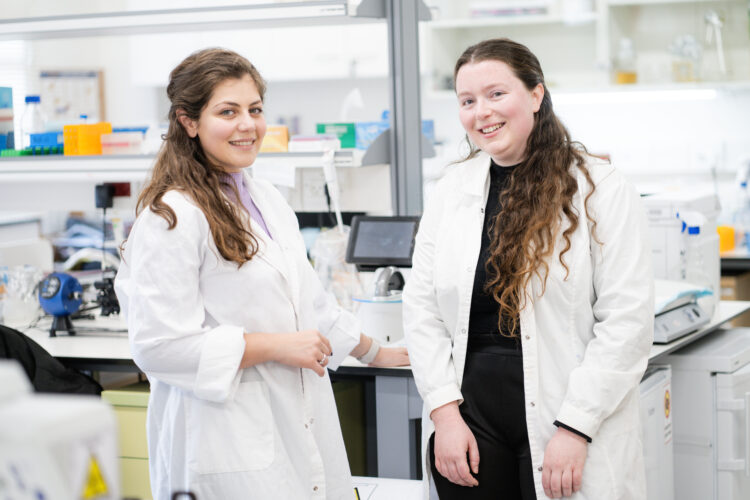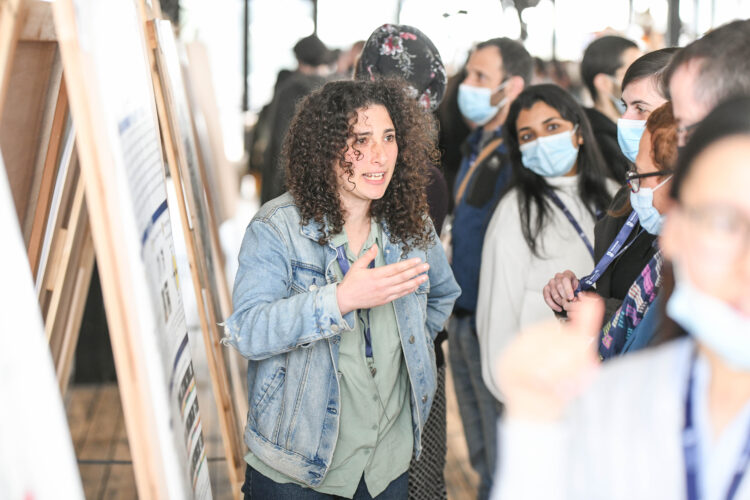Why Biology? 
As biologists, we seek to uncover the mysteries of life and to understand the mechanisms and principles which allow the world to exist; to arouse curiosity and reveal some of the tremendous potential that lies in life sciences.
Contemporary biology is by definition a study of complex, tech-based systems. The life sciences sector has taken an enormous leap forward during the past few decades, extending its boundaries to the limits this very year. While in the past our research revolved around the individual unit – phenomenon/animal/cell – today it is focused on studying the relationships between entire biological systems and analyzing very large databases (millions of data at the same time) at a much larger resolution. Today, the scientist does not look at the individual molecule, but at super processes and superstructures – studying millions of intestinal microbes, trying to understand the interactions between all the different individuals in an ecological habitat, studying parts of molecules and even individual atoms.
Exploring the principles, relationships and rationales that form the foundation for understanding the science of life, building a base on which to construct the solutions for the medical and environmental challenges and diseases of the 21st century.
The ability to make new discoveries and inventions in life sciences has developed tremendously. In fact, right now, in this past year, we have witnessed the global life science community manage to develop a new COVID-19 vaccine within a mere 9 months. A task that was once considered impossible is being completed in record time before our very eyes. Our aim at the Faculty of Biology is to conduct the research that would be able to provide a solution for any biological or medical challenge that may come.
The undergraduate students of today are the scientists of tomorrow. Some of them will proceed to postgraduate studies at our Faculty in preparation for a career in research. During their Bachelor studies, they get a taste of many different fields of knowledge in the life sciences, and acquire practical skills in analyzing complex systems, critical thinking and understanding some of the mysteries of life. Today’s rapidly evolving research and employment market are characterized by high demand for specialists with multidisciplinary knowledge and background. The technologically unique environment of the Technion allows everyone to learn and specialize in various fields of life sciences at the very top standard.
Our academic staff includes about 36 senior researchers in a wide variety of fields, from structural biology and biophysics, molecular biology, biochemistry, and bioinformatics, to research in the fields of cancer, developmental biology, and ecology.
The Faculty’s academic staff are also the core undergraduate teaching staff. Students at the Faculty get to learn directly from world-renowned researchers and acquire essential tools in numerous fields of biology. And because our lecturers are also involved in active research, the study curriculum is being updated all the time in accordance with new worldwide developments and discoveries.
Our Faculty also shares a roof with some of Israel’s leading research centers, including the Smoler Proteomics Center, The Technion Genome Center, The Russell Berrie Nanotechnology Institute (RBNI), and The Lorry I. Lokey Interdisciplinary Center for Life Sciences & Engineering.
Why Study Biology at the Technion?
Multidisciplinary approach – The challenges we face in the 21st century are more complex than ever before; to deal with them, we need to think out of the box and be critical and creative. Today’s rapidly evolving research and employment market are characterized by a high demand for specialists with multidisciplinary knowledge and background.
The physical proximity to and academic interaction with the faculties of engineering, diverse academic staff and proximity to on-campus research centers, which the Technion can offer, help create multidisciplinary discourse that will give you a clear edge, whether you are applying for postgraduate studies or pursuing a career in relevant industries.
Broad knowledge base in biology and exact sciences – Our students attend courses taught by some of the world’s top engineering faculties, and receive the broadest and most in-depth base of knowledge not only in life sciences, but in the exact sciences (physics, math, chemistry, computer science) as well.
The Faculty of Biology also offers study programs jointly with the faculties of Chemical Engineering, Materials Engineering and Computer Science. This integration of science and technology will provide you with the best tools for dealing with the challenges of tomorrow and leading groundbreaking multidisciplinary research.
Academic nurturing and personal mentoring – Every year, the Faculty admits a relatively small group of students who we believe can manage the unique study programs. This allows us to get to know each student personally. The classes and study groups are small and intimate, allowing personal and professional nurturing of students with great emphasis on the development of practical skills. Our students are involved in the Faculty’s social and academic events and take active part in the building of curricula and study materials.
The Technion’s Faculty of Biology is conducting cutting-edge research:
At our Faculty, postgraduate students and top undergraduate students in their third year participate in research activity in the Faculty labs.
Our Faculty conducts research in such fields as:
Biophysics
Structural biology
Bioinformatics and computational biology
Molecular genetics and genetic engineering
Genomics and proteomics
Epigenetics
Developmental biology
Research of cancer and drug development
Stem cells and tissue recreation
Microbial ecology
Career options
The Faculty of Biology’s study programs teach you to think creatively and provide you with in-depth knowledge in many different fields of biology. For these reasons, many of our graduates proceed to postgraduate (Master and doctoral) studies in top academic institutions worldwide. These are the future leaders of scientific research in Israel and abroad, who help advance science and human knowledge. Our graduates pursue careers in a variety of fields:
- Research in academic and research institutions in Israel and abroad: Postgraduate studies followed by a career in science (Master’s degree or four-year medical school). Work in laboratories and R&D centers in universities, schools and government agencies.
- Working in the Life Science industry: Biotech and biopharmaceutical industries, biotech startup companies, ecology, diagnostic and pharmaceutical companies, biodata, medical devices.
- Working in medical labs and public organizations: Hospitals and healthcare organizations, forensic labs, patent offices, genetic testing, development of diagnostic tests, computer analysis. Environmental protection organizations.
Study Programs
The Faculty’s basic BSc. Biology Program 
provides a deep general knowledge base in exact sciences along with broad understanding of each of the fields of contemporary biology. Its unique combination between courses in Biology and other exact sciences (math, physics, computer science) makes it suitable for people who have a passion for Biology as well as high abilities in the exact sciences.
The basic BSc. program is a three-year program.
First Year – The first year focuses on providing a strong knowledge base in exact sciences (Math, Physics and Chemistry) and basic courses in Biology (evolution, Genetics, Biochemistry).
Second Year – In their second year, students attend multiple mandatory courses in a variety of fields in contemporary biology, from cellular and molecular to whole organism.
Third Year – In their third year, students may choose elective courses according to their interest. The Faculty offers a wide variety of advanced electives in every field of the Life Sciences. In addition, students may also take selected courses offered by other faculties at the Technion.
Research-Oriented Honors Program 
The Purpose of the Program
The Research-Oriented Honors Program is a three-year program for Biology students who have completed their first year with top marks and are interested in going into research. The program provides research tools and knowledge in Biology, Chemistry, Physics and Math in preparation for postgraduate studies and/or research and development jobs in the academy or the biotech and pharmaceutical industries.
Students who meet the program requirements shall receive an honors program graduation certificate in addition to their BSc degree. Completion of the program gives automatic admission for graduate studies in Biology, subject to finding an MSc supervisor. Some of the students shall receive tuition funding from the Faculty. Students with relevant academic background from other faculties at the Technion or other academic institutions in Israel may apply for the program.
Program Requirements – Successful completion of all the first-year mandatory courses with an average score of 88 or higher in the first semester and the second semester’s first exam session, plus a personal interview.
Program Overview
1.Students must maintain a cumulative average within the Faculty’s top 15%, and have a follow-up interview.
2.Each student will be supervised by a staff member throughout their studies.
3.The program includes two research project courses – Honors Program Research Project and Biology Research Project.
4.The laboratory work for those projects has to be completed during the summer term.
5. Electives include elective undergraduate and postgraduate courses from the Faculty of Biology and other faculties of the Technion, subject to approval by the student’s advisor. Students who complete their undergraduate requirements may start accumulating credits that shall be counted as part of the 30-credit requirement for a master’s degree.
Joint Programs 
The Technion’s Faculty of Biology offers four study programs that are joint with other faculties. Students in those programs may also take courses from additional disciplines. By the end of your studies, you will have gained knowledge that is both extensive and in-depth.
The multidisciplinary study programs give you knowledge from multiple disciplines, providing unique skills and abilities. Graduates in any of those programs can pursue a career in fields where their multidisciplinary knowledge gives them an edge. Or they can choose to focus on one of the disciplines they studied, like a regular graduate in one of the faculties.
The four multidisciplinary programs :
1.Biology-Chemistry dual major track – A joint program with the Faculty of Chemistry.
2.Biochemical Engineering – A joint program with the Faculty of Chemical Engineering.
3.Biology and Materials Engineering – A joint program with the Faculty of Materials Science and Engineering.
4.Computer Science with a focus on Bioinformatics – A joint program with the Faculty of Computer Science.
Graduate Student experiences 
Anna Zuckerman – QC Team Lead at Pluristem – Completed her bachelor’s and master’s degrees in the faculty of Biology.
I started studying Biology at the Technion when I was 23. After I finished my BSc, I proceeded to an MSc in Endocrinology – a field I encountered during my undergraduate studies and found fascinating.
I was actually always interested in Biology. It’s a very broad discipline that keeps growing more and more these days. You can use it to influence and improve our everyday lives, whether by developing drugs, vaccines, medical devices, genetic counseling, clinical trials, and even cosmetics and plants (such as cannabis). Biology really is the basis of everything.
I always wanted to study in the Technion. Beside the fact that it has the highest academic level, the Faculty and different study programs collaborate with other science and engineering faculties, while the staff and the student association – the best in the country – are always helpful and nice.”
Can you tell us a little about your current job, and how you got there?
When I was about to finish my master’s degree, I decided it was time to try myself out in the industry. I sent my CV to some job sites, and luckily, I was very soon contacted by Pluristem, a company located in Matam High-tech Park, in Haifa. Pluristem is a biomedical company that develops placental cell therapies that can be used without the need for tissue or genetic matching. The company’s products are currently in advanced phases of clinical trials to test their efficacy in treating conditions like ischemic diseases, inflammation, muscle injuries, hematological disorders, and exposure to radiation.
I started working as a QC analyst to gain some experience in the industry, to learn how a plant works and what types of jobs which included product definition and quality checks are available, and to better understand my career options.
After about a year on the job, my supervisors saw my potential, and I was promoted to team lead. The new position allowed me to develop my management skills and provide training and professional assistance to my staff, and it’s all based on the knowledge and tools I acquired at the Technion.
How is work in the industry different from work in the academy, and what would you recommend?
People with a passion for research will often choose to stay in the academy. But I want to emphasize you can do research work in industry as well. The difference is that in industry, your research will be aimed at serving the company’s/organization’s needs. It’s important to remember there are many different types of jobs in the industry, so nearly everyone can find something that suits them.
Today, when I recruit for my team, I can recognize a Technion graduate from miles away.
The Technion teaches you to think, to learn on your own, and gives you the basic skills which will help you tackle any new task or project you are assigned. It’s an enormous advantage in an industry that’s made up largely of growing startup companies.
Is an advanced degree absolutely necessary to advance?
From what I can see – of course, each case is different – timing is important. Someone with a bachelor’s degree can start as a lab technician or lab manager in a small startup company and grow with it and become team lead or even department manager. In research positions an advanced degree, especially a PhD, is definitely a big advantage, but if you are more interested in development, QA or lab management, a master’s degree is enough and won’t hold you back. To succeed – and this is true in every field – you must be creative, have ambition, always think about how you can improve and what puts you above everybody else. But if you’re the kind of person who just wants to work in peace, there are a lot of jobs for you, too.
I can say I learned a lot of practical skills during my MSc studies. I was taught how to write a paper properly, how to plan an experiment, how to properly think, how to take a research question or project and develop it further. I was taught to quickly learn new working techniques and trained in project management, decision making, and top-level results analysis.
Would you recommend others study Biology?
A thousand times yes!
For the last few decades, the entire discipline of Life Sciences has been growing more than any other field. The Biology of tomorrow can be very practical and deal with some of humanity’s greatest challenges, like cancer, COVID-19, and curing diseases. Taking part in the development of a drug that can improve people’s lives gives you enormous satisfaction and sense of meaning.
Krauz Miryam | 04-8294213 | miriamk@technion.ac.il







